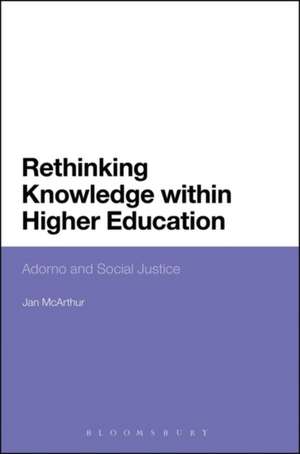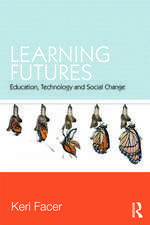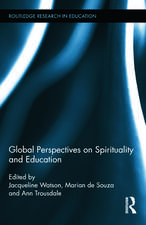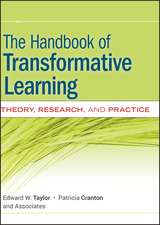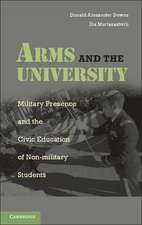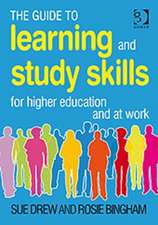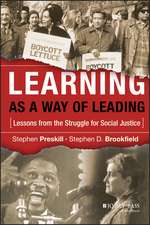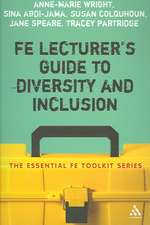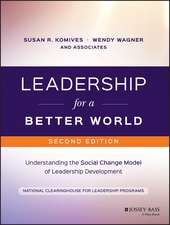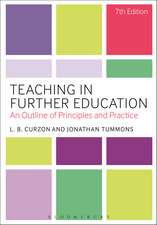Rethinking Knowledge within Higher Education: Adorno and Social Justice
Autor Dr Jan McArthuren Limba Engleză Paperback – 4 iun 2014
| Toate formatele și edițiile | Preț | Express |
|---|---|---|
| Paperback (1) | 255.84 lei 6-8 săpt. | |
| Bloomsbury Publishing – 4 iun 2014 | 255.84 lei 6-8 săpt. | |
| Hardback (1) | 831.03 lei 6-8 săpt. | |
| Bloomsbury Publishing – 19 dec 2012 | 831.03 lei 6-8 săpt. |
Preț: 255.84 lei
Preț vechi: 294.53 lei
-13% Nou
Puncte Express: 384
Preț estimativ în valută:
48.95€ • 51.39$ • 40.63£
48.95€ • 51.39$ • 40.63£
Carte tipărită la comandă
Livrare economică 10-24 aprilie
Preluare comenzi: 021 569.72.76
Specificații
ISBN-13: 9781472576286
ISBN-10: 1472576284
Pagini: 208
Ilustrații: black & white illustrations
Dimensiuni: 156 x 234 x 11 mm
Greutate: 0.28 kg
Ediția:NIPPOD ed.
Editura: Bloomsbury Publishing
Colecția Bloomsbury Academic
Locul publicării:London, United Kingdom
ISBN-10: 1472576284
Pagini: 208
Ilustrații: black & white illustrations
Dimensiuni: 156 x 234 x 11 mm
Greutate: 0.28 kg
Ediția:NIPPOD ed.
Editura: Bloomsbury Publishing
Colecția Bloomsbury Academic
Locul publicării:London, United Kingdom
Caracteristici
Contributes to educational debates seeking to move critical pedagogy beyond romantic possibilitarianism.
Notă biografică
Jan McArthur is Lecturer Education and Social Justice within the Department of Educational Research at Lancaster University, UK. She has previously taught at the University of Edinburgh, UK, and Monash University, Australia. Her research spans the nature and purposes of higher education, social justice within and through higher education and dialogue/student voice within assessment, learning and feedback.
Cuprins
Introduction: Adorno and Higher Education1. Knowledge and Social Justice in Higher Education2. Approaches to Critical Theory and Critical Pedagogy3. The Importance of Knowledge Being Not Easily Known4. Beyond Standardized Engagement with Knowledge5. The Social Implications of Engaging with Knowledge in Higher Education6. Challenging the Theory-Practice Dichotomy7. Towards a Higher Education Transcending Both the Elite and the MainstreamReferencesIndex
Recenzii
A highly intelligent book in which the author brings her considerable scholarship to bear on crucial questions regarding the role and purpose of higher education. Her reading of Adorno is acute and nuanced and her application of 'critical theory' to the current higher education policy context is sharp and politically astute. McArthur's argument for the necessary relation between higher education and social justice is both compelling and inspiring.
Writers on social theorists often fall into the trap of being as 'difficult' to follow as those whose theories they are discussing. Jan McArthur is unusual in this respect, writing clearly, incisively and intelligibly, demonstrating what the work of one of the less quoted social theorists, Adorno, has to offer for a critical understanding of higher education today.
For those of us who refuse to abandon knowledge's special place in higher education, McArthur's book reminds us that there is a job to be done in fighting for it - not as an end itself - but as part of a commitment to social justice. Situated within a tradition of critical pedagogy and with the aid of Adorno's writings, the project of McArthur's book is to reclaim a transformative narrative for knowledge, and to demonstrate why this ought to be the way forward for higher education. Amid the now familiar contradictory narratives of higher education thesis, McArthur's analysis is not only striking and intelligent, as a practice of 'thinking otherwise' it might also be seen as a welcome piece of dangerous scholarship. Any serious researcher or scholar of higher education looking for conceptual and theoretical gems to re-ignite their commitment to knowledge as a complex endeavour will find that this book has plenty to offer.
This necessarily brief overview of the book cannot adequately convey the significance of McArthur's refreshing and well-written work. Her argument for placing social justice at the very core of higher education is both forceful and convincing and relevant for those teaching in religious studies or theology departments. For faculty struggling with questions regarding the future of higher education and who are looking for something beyond a business-model approach, McArthur's book offers a worthy conversation partner.
Writers on social theorists often fall into the trap of being as 'difficult' to follow as those whose theories they are discussing. Jan McArthur is unusual in this respect, writing clearly, incisively and intelligibly, demonstrating what the work of one of the less quoted social theorists, Adorno, has to offer for a critical understanding of higher education today.
For those of us who refuse to abandon knowledge's special place in higher education, McArthur's book reminds us that there is a job to be done in fighting for it - not as an end itself - but as part of a commitment to social justice. Situated within a tradition of critical pedagogy and with the aid of Adorno's writings, the project of McArthur's book is to reclaim a transformative narrative for knowledge, and to demonstrate why this ought to be the way forward for higher education. Amid the now familiar contradictory narratives of higher education thesis, McArthur's analysis is not only striking and intelligent, as a practice of 'thinking otherwise' it might also be seen as a welcome piece of dangerous scholarship. Any serious researcher or scholar of higher education looking for conceptual and theoretical gems to re-ignite their commitment to knowledge as a complex endeavour will find that this book has plenty to offer.
This necessarily brief overview of the book cannot adequately convey the significance of McArthur's refreshing and well-written work. Her argument for placing social justice at the very core of higher education is both forceful and convincing and relevant for those teaching in religious studies or theology departments. For faculty struggling with questions regarding the future of higher education and who are looking for something beyond a business-model approach, McArthur's book offers a worthy conversation partner.
